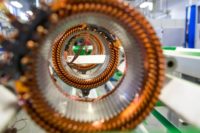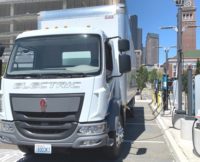CUPERTINO, CA—The Internet has been buzzing with speculation that the company behind the iPad, iPhone and other popular consumer electronic devices may soon enter the electric car market. According to the Reuters news agency, Apple Inc. will launch an electric vehicle by 2024. The company is currently developing its own proprietary battery and self-driving technology as part of Project Titan.
Reuters claims that Apple engineers have been secretly working on a lithium-iron phosphate battery that can be packaged more tightly in the car’s battery pack, cutting down on weight while increasing its potential energy density. It says the new battery design could “radically” reduce the cost of batteries and increase the vehicle’s range.
If Apple does, indeed, go ahead with the ambitious plan, it’s unclear how and where the electric vehicle would be produced. One potential option would be to outsource production to a contract manufacturer. That’s a strategy that Apple has successfully used for years to mass-produce its electronic devices.
Ironically, the company that assembles most of those items, Foxconn Technology Group, recently unveiled plans to produce electric vehicle components. Foxconn claims that its MIH software and hardware open platform will become the “Android system for the EV industry.”
Foxconn engineers have also been developing key EV components. “Through years of research, [we have] developed a unique high-intensity die-casting material that is strong, highly malleable and resistant to corrosion, allowing [our] lightweight and modularized open-chassis power platform to be a competitive option in the market,” claims Young Liu, chairman of Foxconn Technology Group.
In addition, Foxconn announced that it plans to debut a commercialized solid-state battery by 2024. According to Liu, it “will offer high performance and safety at a low cost [and] will be the solution to the woes of EVs running on liquid-state batteries.”
If the recent reports about Apple are true, and if Foxconn is somehow involved in the production strategy, perhaps Apple can create further shockwaves in the auto industry by deciding to build its electric vehicle in Wisconsin. Foxconn already has a manufacturing facility in Mount Pleasant, WI, which is located near a large CNH Industrial factory that assembles Case IH farm tractors. The Foxconn campus has been controversial since it was announced with much fanfare in 2017.
Mount Pleasant just happens to be a few miles north of Kenosha, a blue-collar city that has a long, proud automotive production heritage. In the early 1900s, shortly after selling his large bicycle factory (Gormully & Jeffery) in Chicago, Thomas Jeffery moved 60 miles up the shore of Lake Michigan and began producing horseless carriages. His 1902 Rambler Model C Runabout soon became one of the best-selling vehicles in the fledgling auto industry (along with Ransom Olds, Jeffery also used an assembly line to build cars several years before Henry Ford did).
Charles Nash, a disgruntled ex-president of General Motors, purchased Jeffery’s company in 1916 and changed the named to Nash Motors. That company eventually became part of American Motors Corp. in the mid-1950s (AMC itself was acquired by Chrysler in 1987) and continued to mass-produce cars in Kenosha until late 1988.
Perhaps Foxconn’s much-maligned Wisconsin facility could be used to produce the Apple car in the near future. That would return the badger state to the ranks of major automobile producing regions (besides Kenosha, Janesville also was an important automaker—until a decade ago, it was home to a large GM plant that assembled Chevrolets).



